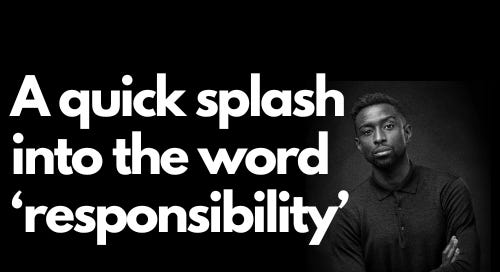I didn’t make this one up, but it will probably stay with me forever.
Question number 1: What is a reaction?
Dictionary answer:
1. something done, felt, or thought in response to a situation or event.
eg: "my immediate reaction was one of relief"
My answer:
A reaction is something that can save your life. It happens without thought, designed to kick into gear before your rational mind has a chance to formulate a plan of action. Fight, flight or freeze are reactive states, designed to protect you at times of high danger.
The problem is that reactions aren’t always the best course of action. We can actually be at the mercy of our reactions, when we act without thinking, allowing an unfiltered emotion to translate into an act. Someone insults you and you might react badly. When in fact, the best thing to do is to pause… wait… delay… then act according to your better nature.
Question number 2: What is a response?
Dictionary answer:
1. a verbal or written answer.
eg: "there was laughter at his response to the question"
2. a reaction to something.
eg: "an extended, jazzy piano solo drew the biggest response from the crowd"
My answer:
A response is the ‘act according to your better nature’ situation that I just described above. To respond requires maturity and foresight. It requires thought. The response might feel counter intuitive, but it will be an action that represents you at your best. It’s a state of being that religious teachings, across cultures, seek to cultivate. Be your best self regardless of the impulses created by a given situation. Don’t give in to a reactive state.
The ability to respond can be understood as ‘response-ability’ or, is it’s more frequently spelled ‘responsibility’.
Dictionary definitions:
the state or fact of having a duty to deal with something or of having control over someone.
eg: "a true leader takes responsibility for their team and helps them achieve goals"
the state or fact of being accountable or to blame for something.
"the group has claimed responsibility for a string of murders"
But I like thinking about it in this way. I like to think being ‘responsible’ is really all about being in a state of readiness to be your best self and do the best thing. In this sense, our responsibilities aren’t simply things that we have to do, but rather a calling to be the best versions of ourselves for a greater good. It sounds awfully earnest, but we really do have a responsibility to tackle problems and respond with long-term, collective prosperity as our aim.
Go further and it becomes important to think about how able you are to respond. When I think about my work in anti-racism, the foundations are built on my increasing knowledge and search for clarity as to what racism even is. The only reason I can enter these conversations with some level of confidence is because I am able to respond, based on what I’ve learned; am learning.
“I’m scared of getting it wrong.”
By far, hands down, this is the most common phrase I hear in my travels as an anti-racist educator, when I visit schools, businesses, organisations and institutions. The fear of saying the wrong thing, or not knowing what to say, actually prevents people from taking on the responsibility of tackling racism, even when they know it’s doing damage. This itself comes from a lack of confidence, which is of course linked to a lack of knowledge. It’s genuinely scary to dive into a problem when you don’t know enough about what you’re going to find.
Being responsible becomes easier when you know what you’re getting into. That’s why I believe these posts, these definitions and distinctions, are important: I’m trying to offer knowledge and vocabulary that will help people to take on the responsibility of undoing racism – a responsibility that we all share.



